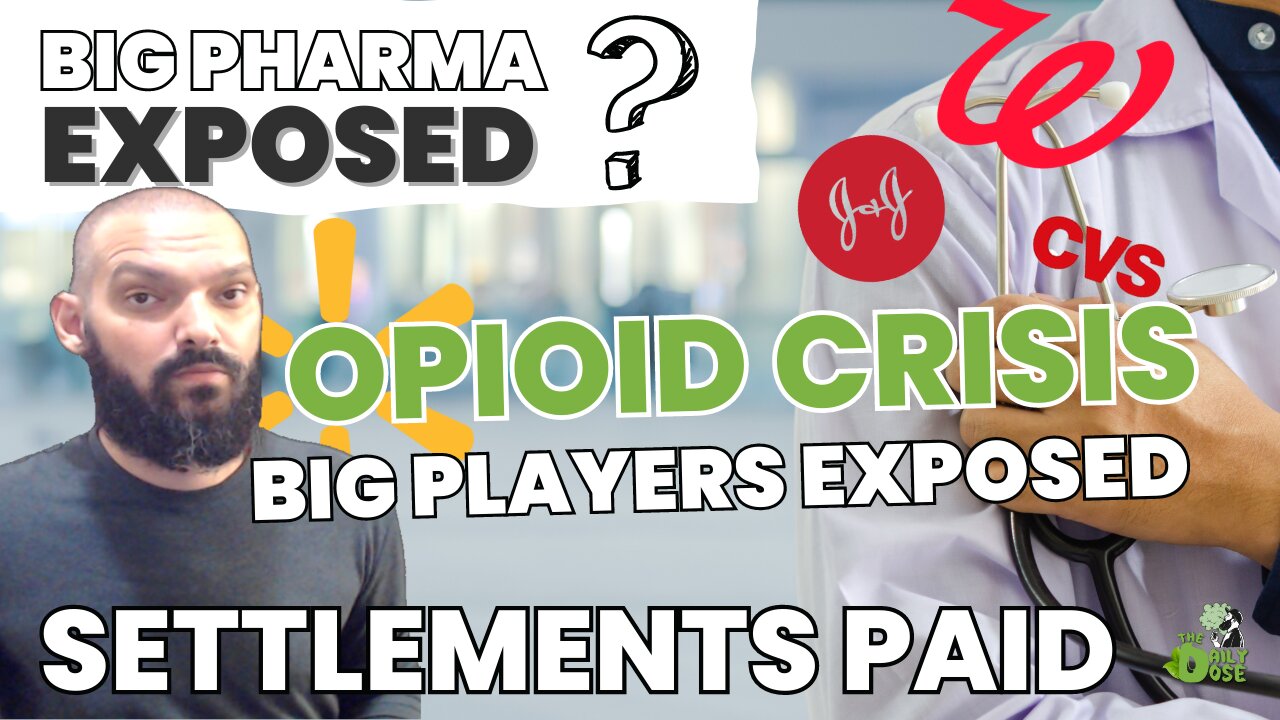Premium Only Content

Opioid Lawsuits And Settlement Explained Big Pharma Exposed
Today's Daily Dose is partly brought to you by
Grassdoor.com cannabis delivered fast SAVE 40% OFF Your Entire Purchase USE CODE: DAILY @ Checkout and
by Social CBD discover the power of this cannabinoid it may aid with stress, mood and sleep
https://socialcbd.pxf.io/n1GAJo
by Audible discover and enjoy a vast collection of audiobooks, stories and more save now on your first months subscription.
https://www.audibletrial.com/e462rj
If you want to help support this channel and the content please consider checking out my website TheDailyDose.co
You can also checkout these Top 5 Best Natural Health Remedies
https://5bestnaturalremedies.com/?id=6411ea08fb3fa87c9ee0f0b3
Parties Involved in Lawsuits
Pharmaceutical Manufacturers: These companies develop, produce, and market prescription opioids. Lawsuits against manufacturers often revolve around allegations of deceptive marketing practices, downplaying addiction risks, and failing to disclose crucial information about the drugs.
Distributors: Pharmaceutical distributors play a crucial role in the supply chain, distributing prescription opioids to pharmacies, hospitals, and healthcare providers. Lawsuits targeting distributors often focus on claims of inadequate monitoring, suspicious order fulfillment, and failure to report suspicious activity.
Healthcare Providers: Physicians, pharmacists, and healthcare facilities can also face legal action if they are accused of prescribing opioids recklessly, negligently, or in violation of professional standards.
Grounds for Lawsuits
Prescription opioid lawsuits typically involve one or more of the following legal claims:
False Advertising: Allegations that pharmaceutical manufacturers misrepresented the safety, effectiveness, or addictive nature of their drugs in their marketing materials.
Failure to Warn: Accusations that manufacturers and distributors failed to provide adequate warnings about the risks, side effects, and addictive potential of prescription opioids.
Negligence: Claims that healthcare providers breached their duty of care by overprescribing opioids, disregarding patient safety, or failing to monitor patients for signs of addiction.
Public Nuisance: Lawsuits that argue the opioid epidemic constitutes a public nuisance, adversely affecting communities and requiring financial compensation for associated damages.
Filing a Prescription Opioid Lawsuit
If you believe you have a valid claim related to prescription opioids, here are the general steps involved in filing a lawsuit:
1. Consultation with an Attorney
To assess the viability of your case, it is crucial to consult with an experienced attorney specializing in prescription opioid lawsuits. They can evaluate your situation, gather relevant evidence, and guide you through the legal process.
2. Investigation and Evidence Gathering
Your attorney will conduct a thorough investigation to gather evidence supporting your claim. This may involve reviewing medical records, obtaining expert opinions, and analyzing marketing materials from pharmaceutical companies.
3. Complaint Filing
Once your attorney has built a strong case, they will file a formal complaint in the appropriate court. This document outlines your allegations, identifies the parties involved, and states the damages you seek.
4. Discovery and Settlement Negotiations
During the discovery phase, both parties exchange relevant information, including documents, depositions, and interrogatories. Settlement negotiations may occur at this stage, with the aim of reaching a mutually agreeable resolution.
5. Trial or Settlement
If a settlement cannot be reached, the case proceeds to trial. At trial, both sides present their arguments, and a judge or jury determines the outcome. Alternatively, parties may choose to settle before trial, resulting in a negotiated resolution.
Seeking Compensation and Remedies
If your prescription opioid lawsuit is successful, you may be eligible for various forms of compensation and remedies, including:
Medical Expenses: Reimbursement for medical costs incurred due to opioid addiction or related conditions.
Rehabilitation Costs: Coverage for addiction treatment, rehabilitation programs, and counseling.
Lost Wages: Compensation for lost income resulting from opioid addiction or related consequences.
Pain and Suffering: Damages awarded for physical and emotional pain endured as a result of opioid addiction.
Punitive Damages: In cases of extreme negligence or misconduct, additional damages may be awarded to punish the responsible parties.
Main Article
https://www.forbes.com/advisor/legal/personal-injury/prescription-opioid-lawsuit-guide/
#opioids #opioidsettlement #opioidcrisisexplained #opioidlawsuit #NatureTherapy #AncientTraditions #MindBodyWellness #alternativehealing #herbalsupplements #healthandwellness #naturalmedicines #plantmedicines #learnaboutplantmedicines #thedailydose #wickedsources
-
 7:12
7:12
News And Media
1 year agoCalifornia And Psychedelics The News Explained
163 -
 3:06:47
3:06:47
Laura Loomer
7 hours agoEP131: Zohran Mamdani's Radical Roots EXPOSED
34.6K26 -
 2:42:53
2:42:53
TimcastIRL
8 hours agoDOJ Drops MASSIVE Epstein COVER UP, Says There's NO CLIENT LIST | Timcast IRL
242K161 -
 54:25
54:25
Inverted World Live
7 hours agoThe JFK Assassination and How the CIA Made the Zapruder Film | Ep. 70
35.5K11 -
 10:11:25
10:11:25
SpartakusLIVE
15 hours ago$18,000 2v2 WZ Total Frenzy Tournament || #1 Comp Champ is BACK
92.5K4 -
 8:11
8:11
MattMorseTV
1 day ago $18.18 earnedMacron just SURRENDERED.
81.6K96 -
 1:35:03
1:35:03
Glenn Greenwald
10 hours agoTrump DOJ: There's Nothing to the Epstein Story; State Dept: Syria's Al-Qaeda are No Longer "Terrorists;" Trump & Lula Exchange Barbs Over Brazil | SYSTEM UPDATE #482
171K150 -
 2:18:39
2:18:39
We Like Shooting
21 hours ago $7.90 earnedWe Like Shooting 618 (Gun Podcast)
42.6K -
 2:42:17
2:42:17
Barry Cunningham
9 hours agoHERE'S WHY SOME IN MAGA ARE SO NEGATIVE ABOUT PRESIDENT TRUMP?
89.9K41 -
 1:54:30
1:54:30
Joker Effect
7 hours agoWhy Gaming Streamers Aren't Successful and How To Fix It. Tim The Tatman was RIGHT... Kinda
44.7K2